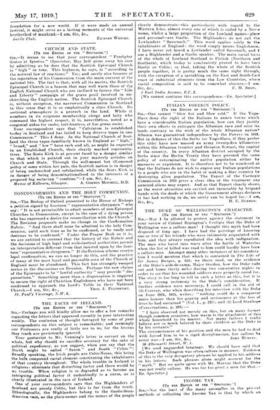THE DUKE OF WELLINGTON'S CHARACTER. (To THE EDITOR Or Tag
" SPECTATOR.”7 Sue—Stay I be allowed to protest against the statement in your review of Colonel Repington's Vestigia that the Duke of Wellington was a callous man? I thought this myth had hires disposed of long ago. I have had the privilege of knowing one or two of his friends who were intimately acquainted with him, and they always repudiated the idea with indignation. The man who burst into tears after the battle of Waterless when the list of killed was read to him could hardly have been a callous man Amongst many other instances of his considera- tion I would mention that which is contained in The Life Sir James Borges, p. Hi; we there read. on the evidenee of the Duke's aide-de-camp, Major Gordon, how the Duke rode out and home thirty miles during two consecutive nights in order to see that his wounded soldiers were properly cared for. The story is too long to tell in suth a letter as this. but it is a very strong testimony to the Duke's consideration. If further evidence were necessary, I could call in the aid of (1) Creevey, who when describing his interview with the Duke on June 19th, 1815, writes: " nothing could do a conqueror more honour than Isis gravity and seriousness at the loss of lives lie had sustained " (Vol. I., p. 237); and (2) Lord Stanhope (Conversations, p. 203):— " I have observed not merely on this, but on many former though common occasions, bow warm is the attachment of this whole household to its master. Not many fathers I really believe are so much beloved by their children as the Duke is by his servants."
The circumstances of Isis position and the men he had to deal with forced him to lie a rigid disciplinarian, but cationa he
[We used unguarded language. We should have said that the Duke of Wellington wan oftenseallous in manner. Evideniss of this is the very derogatory phrases lie applied to his soldiers in his letters. Such phrases alone might account for the " myth." But we quite agree with Mr. Murray that the Duke was not really eellous. He was far too great a man for that.— Eo. Spectator.]


































 Previous page
Previous page